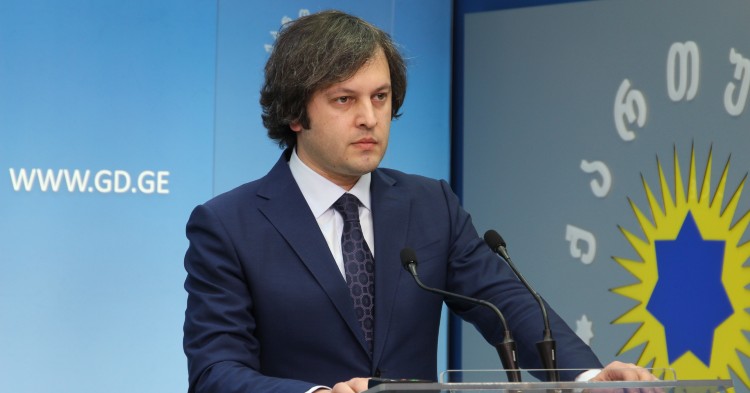Ruling party head says “unacceptable” for MEP to join protest rally of political party

She added she was joining Saturday’s protest to show “solidarity” with the sentenced individual and to Georgian citizens “who support pro-Western and pro-European positions”. Photo: Georgian Dream Press Office
Irakli Kobakhidze, the Chair of the ruling Georgian Dream party, on Sunday called the fact of Viola von Cramon, a member of the European Parliament, joining a rally organised in Tbilisi by a domestic political party on Saturday “unacceptable”, adding it “once again” showed her “attitude towards the Georgian state”.
The comment of the GD official came after von Cramon joined the protest in support of a citizen sentenced to preventive detention by Tbilisi City Court on Friday for having thrown rocks and Molotov cocktails at law enforcement and set fire to a police car during last month’s protests in Tbilisi against the proposed bill on transparency of foreign influence.
Kobakhidze said von Cramon’s participation in the rally - called by the European Georgia opposition party - showed her “disdainful attitude”, and added “[w]hen an MEP attends a protest rally of any political party, this is already unacceptable and once again shows the attitude towards the Georgian state - an attitude that is simply not correct”.
Von Cramon said while she accepted that the attacks on police by the protester could be subject of a criminal case, she found it “unacceptable” for authorities to “single out” the person in question in comments at the Parliament and suggest “he or a specific group of people were undermining the protest”.
She added she was joining Saturday’s protest to show “solidarity” with the sentenced individual and to Georgian citizens “who support pro-Western and pro-European positions”.
The Georgian Interior Ministry said on March 30 it had arrested the offender for the acts during the protests in Tbilisi between March 7-9, adding he also had earlier records of disobedience to police officers and charges of domestic violence.
The demonstrations resulted in the ruling Georgian Dream party withdrawing the bill that called for registration of non-commercial legal entities and media outlets in the country as “agents of foreign influence” if they derive more than 20 percent of their funding from abroad.
The controversial legislative proposal was met with a backlash by domestic opposition, civil sector and diplomatic representations in the country, as well as public rallies outside the legislative body before it was shelved.
 Tweet
Tweet  Share
Share